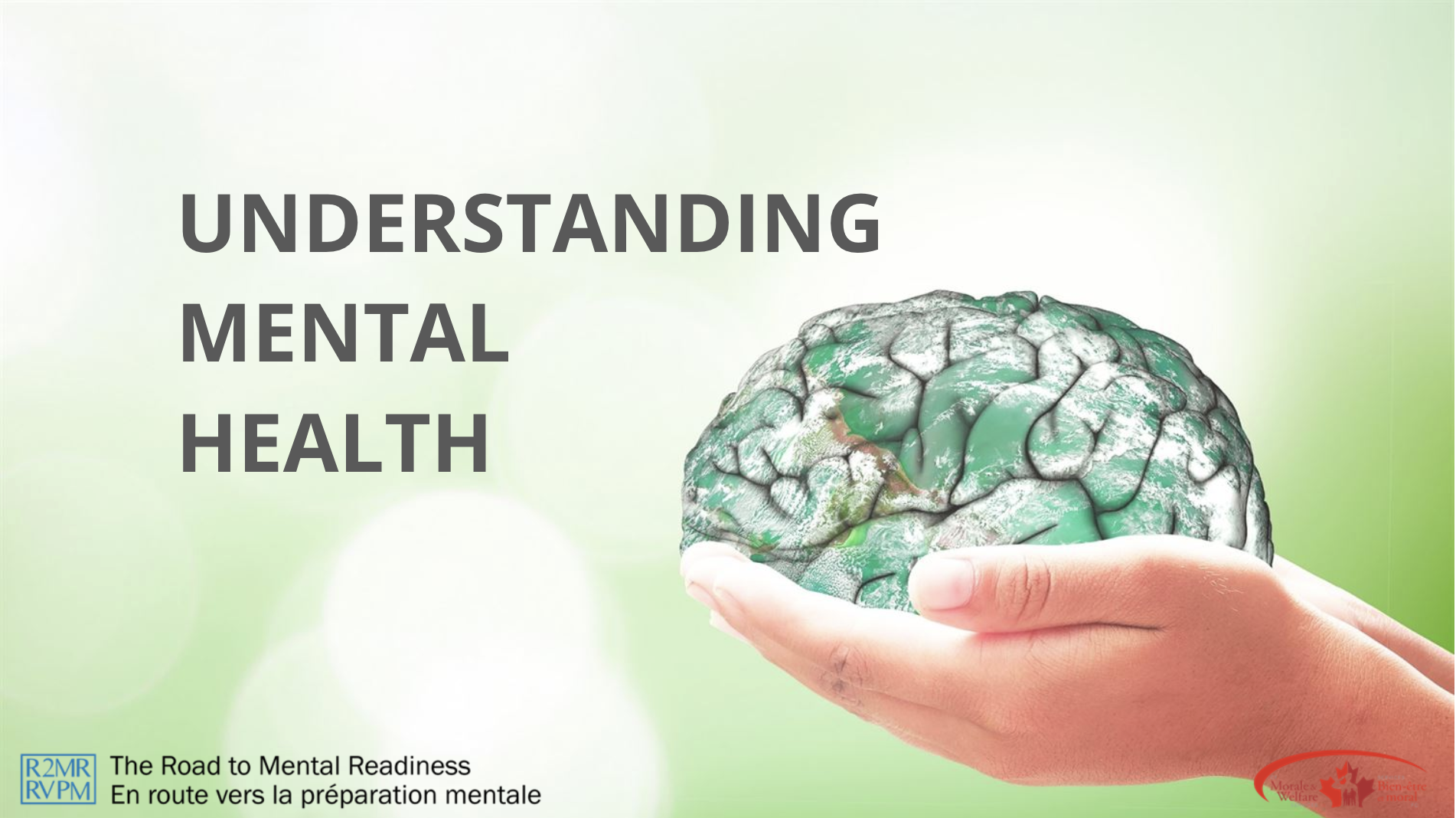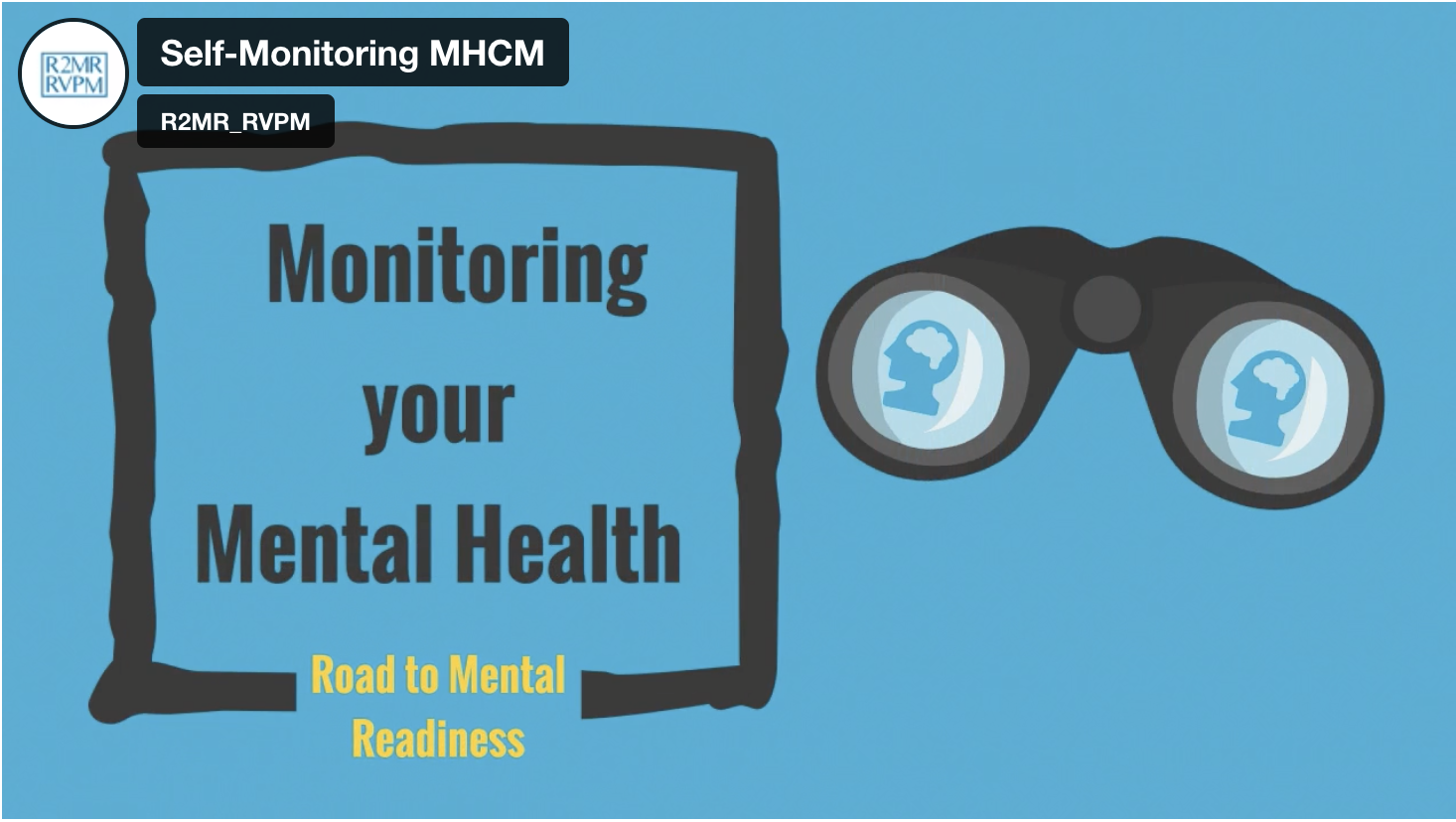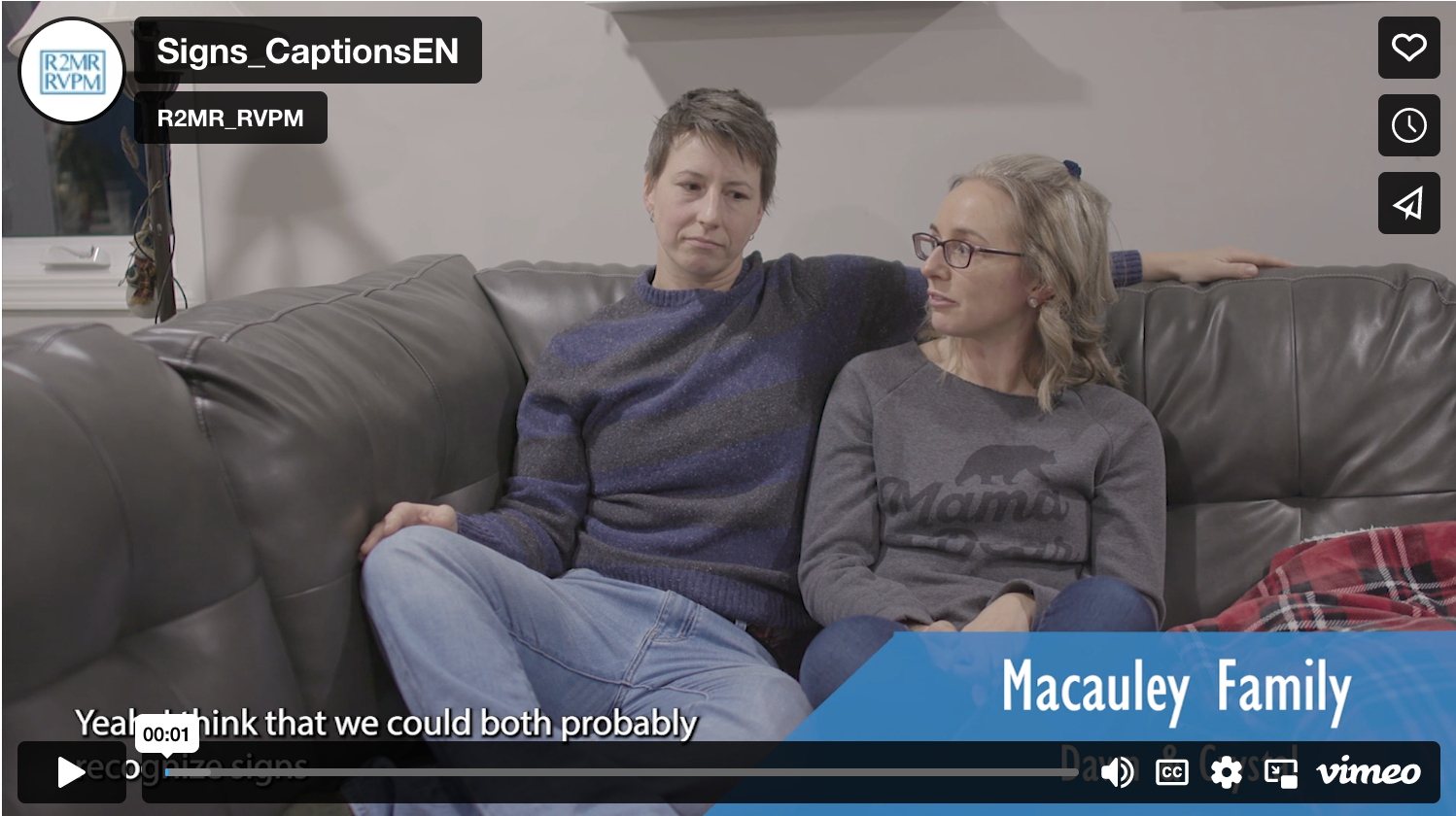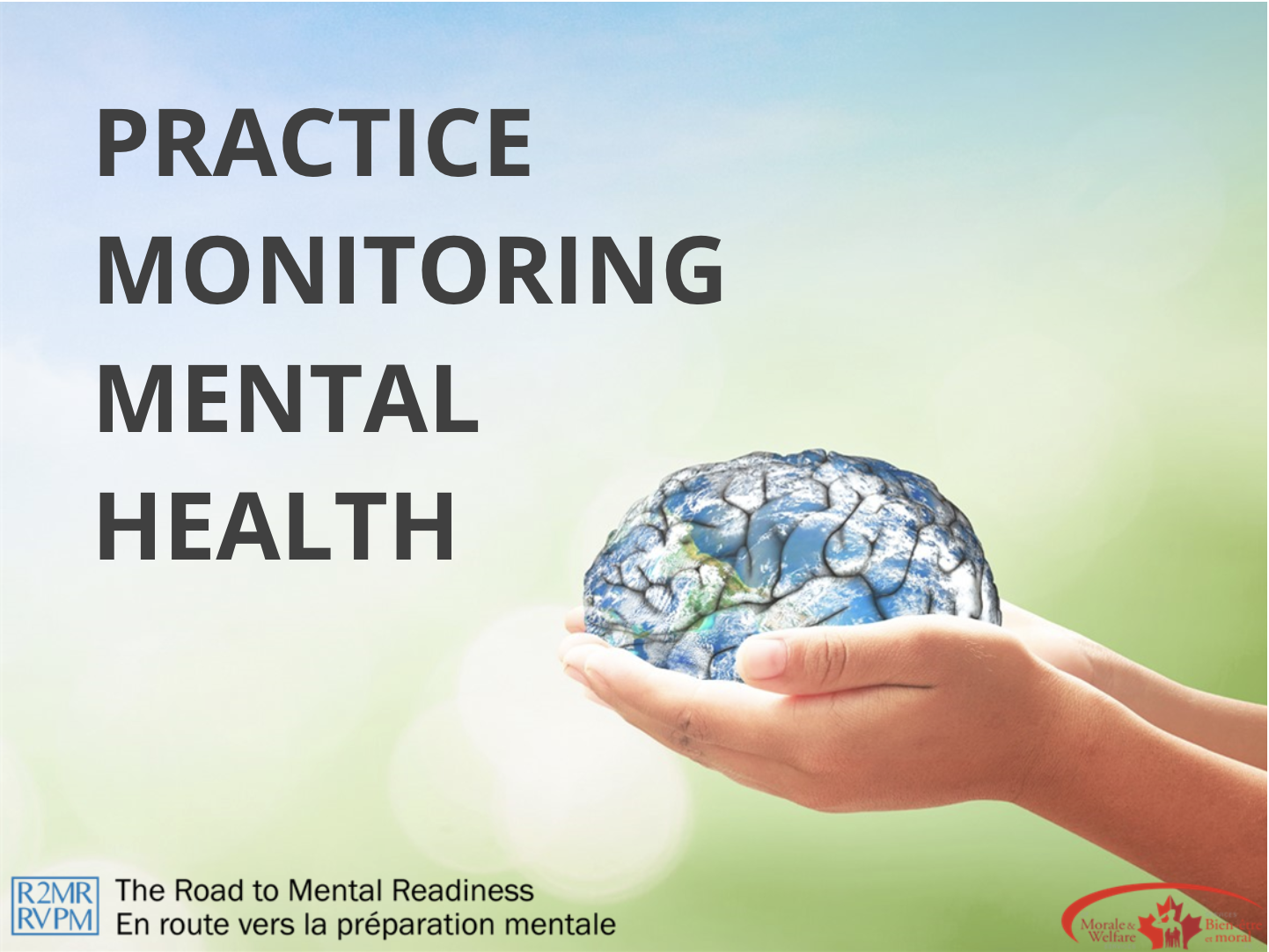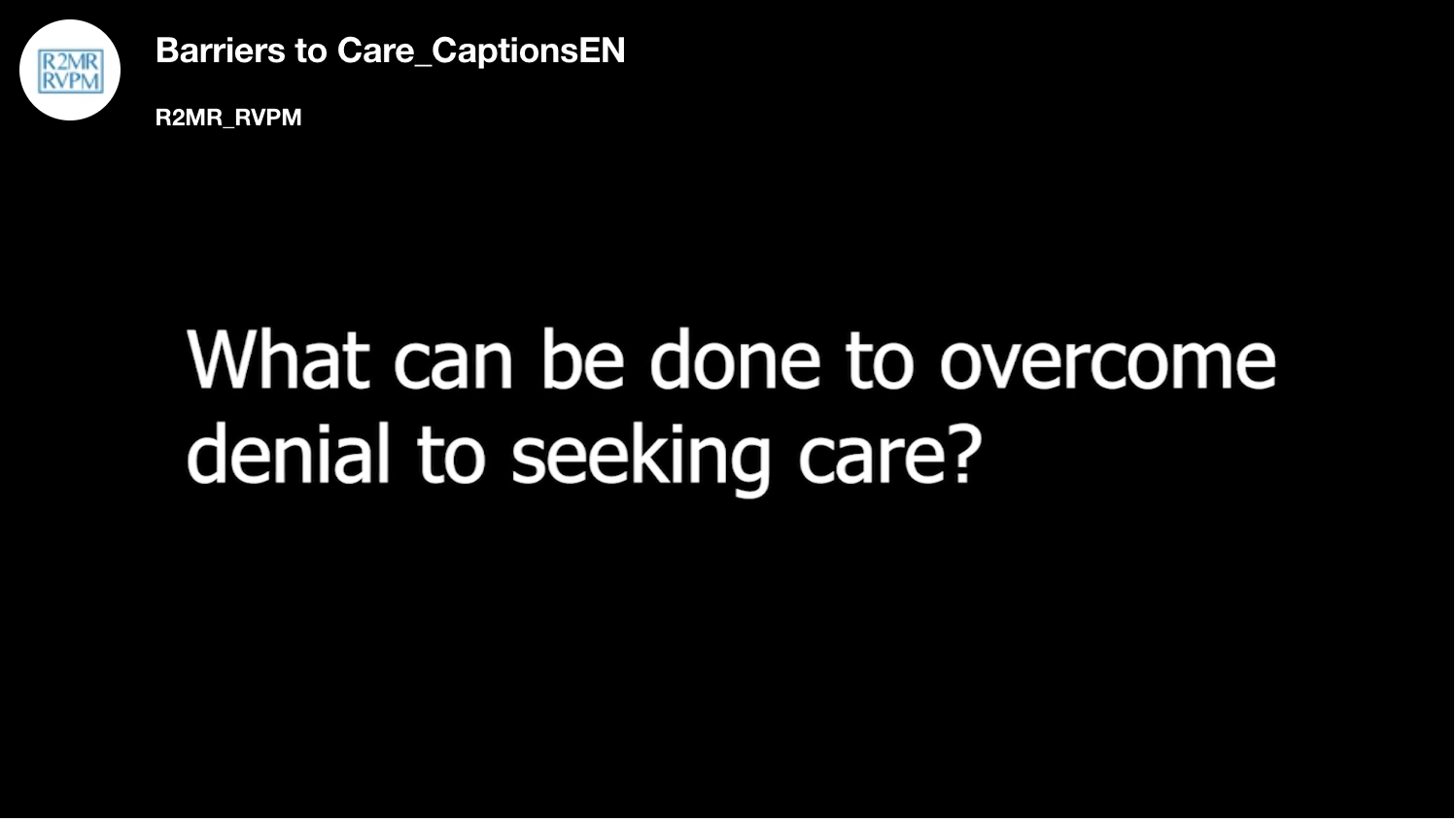What is mental health?
Mental Health on a Continuum
A part of safeguarding our health and resilience is to take an active role in regularly monitoring our mental well-being. Mental Health Continuum Model (MHCM) * is a simple and easy-to-use tool to assist you in doing this.
Note: To clear your answers or restart the activity, please refresh the webpage or exit the learning hub.
Remember, monitoring your mental health on a regular basis is an important step. However, should you notice deterioration, you can refer to other sections of this website, such as Understanding Stress, Self-Care and Individual Resilience, to assist you.
Self-Monitoring
Watch this video to learn more about the continuum, how it can be used to identify changes in mental health and well-being, and when seeking additional resources may be recommended.
Build your own Mental Health Continuum
This interactive learning module allows you to explore the different zones of the MHCM and create a personalized version that is reflective of you. Having each member of the family create their own continuum and sharing it with each other is a great way to monitor each other’s health and well-being.
Signs of Change
Recognizing signs of change in mental health and well-being is vital. In this video Defence families share some of their experiences with learning to recognize signs of declining mental health in themselves and their loved ones. As well, they share what they have learned to do when signs of strain and declining mental health begin to show.
Practice Recognizing Signs of Change
Estimated time: 15 min
Learning objectives
Here you will have a chance to become more familiar with the Mental Health Continuum and see if you can determine how someone is doing based on the scenarios presented.
Use this interactive learning module to practice recognizing signs of change in mental health and well-being along the Continuum. The better you are able to recognize early signs of change in yourself and your loved ones, the sooner you can act to improve and support your or their mental health and well-being.
Overcoming Barriers to Care
There are a number of reasons why individuals, even once they recognize signs of change, may be reluctant to seek professional mental health care. These concerns can include stigma, cost of treatment, time barriers, fear of career consequences, among others. Listen to other Defence families as they talk about ways to overcome these barriers to care seeking.
When to Seek Help
Recognizing when stress has tilted into distress, and additional resources or strategies may be required to address what we are experiencing, is key for promoting resilience and enhancing health and well-being.
Here are some tips that can help you identify when to seek professional medical or mental health support:
- emotional or behavioural reactions have persisted or intensified over the past 4 weeks;
- emotional or behavioural reactions are excessive or out of control; and,
- emotional or behavioural reactions are severely impacting your ability to function at home or at work.
Below are some red flags that indicate help needs to be sought:
- Severe emotional distress
- Persistent insomnia
- Severe interpersonal problems
- Disabling anxiety
- Excessive withdrawal and isolation
- Difficulties limiting use of alcohol or drugs
- Physical aggression
- Family violence or abuse
- Suicidal thoughts or behaviour *
*Worried about someone who may be suicidal? Are you experiencing thoughts of suicide? Contact 9-1-1 or go to your local hospital emergency room for immediate help if you or someone you know are in crisis.
Resilience is often defined as our ability to bounce back from stress and adversity, and part of this is the ability to seek additional support and information when faced with challenges. You do not have to deal with challenges alone. If you need assistance for a mental health issue, please consult the Resource section of this website.
Resources for Unique Challenges
Resilience is often defined as our ability to bounce back from stress and adversity, and part of this is the ability to seek additional support and information when faced with challenges. You do not have to deal with challenges alone.
Below is a list of some challenging circumstances that families in the Defence team may experience. Click on the arrow beside each stressor to see a brief description of the issue and a list of corresponding external resources. Note this list includes external resources only. For internal Defence team mental health resources, please consult the Resources section of this website.
If you or your loved one are experiencing significant distress and your or their immediate safety is at risk, call 9-1-1 or go directly to your nearest hospital emergency room.
- Potentially Traumatizing Events
- Suicide
- Relationship violence
- Addiction
- Family breakdown
- Financial stress
- Assisting an injured/ill loved one
- Recovering from an injury/illness
Potentially Traumatizing Events
If you need assistance for a mental health issue, please reach out to one of the mental health resources in the Resource section of this website.
A potentially traumatizing event refers to any significant adverse situation, event or trauma that may lead to the development of psychological difficulties. Exposure to potentially traumatizing events in the course of duties increases the risk of operational stress injuries (OSI) for some Defence team members. Below are some external sources of information that can help you or your loved one following exposure to a potentially traumatizing event.
Canadian Psychological Association
The Canadian Psychological Association, CPA, is a not-for-profit organization that strives to “improve the health and welfare of all Canadians”. One of the organization’s objectives is to provide Canadians excellence in psychological research and education. This link provides important information about traumatic stress and Post Traumatic Stress Disorder (PTSD).
The Royal – Mental Health Resources
The Royal has been described as “one of Canada’s foremost mental health care, teaching and research hospitals.” Although located in Ottawa, Ontario, The Royal strives to be a hospital without walls by working with individuals where they are. This link provides access to this website where you can seek information about a variety of mental health difficulties, including OSIs and PTSD.
Veterans Affairs Canada
Veterans Affairs Canada, VAC, is a federal department that provides benefits, services and supports to current or former members, or a family member, of the Canadian Armed Forces or Royal Canadian Mounted Police. VAC delivers targeted services to improve the well-being of veterans. The VAC website provides information about mental health and how mental health may be impacted as a veteran.
American Psychological Association (APA)
The American Psychological Association, APA, mission statement reads “to promote the advancement, communication, and application of psychological science and knowledge to benefit society and improve lives.” It is the leading scientific and professional psychological organization in the United States of America. You can access valuable information on recovering from disasters by clicking on the APA heading above (English only).
Suicide
If you need assistance for a mental health issue, please reach out to one of the mental health resources in the Resource section of this website.
Suicide is a complex issue. Most individuals have more than one reason for contemplating suicide or engaging in suicidal or life-threatening behaviour. Many of the warning suicide signs mirror movement to the right on the MHCM, and can also include:
- Increased risk taking such as driving recklessly or ignoring established safety procedures
- Belief that one’s life has no purpose or meaning
- Perceived burden on others such as believing others would be better off without them
- Feeling trapped with no way out to solve current problems
If you notice any of these changes in behaviour or thinking in yourself or a loved one, it may indicate underlying problems and possible suicide risk. Take these signs seriously and seek professional help. The Resources section of this site can assist you in finding help.
To learn more about suicide and life promotion, check out the following resources:
Kids Help Phone
Kids Help Phone is Canada’s only 24/7 national support services that offers professional counselling, information and referrals to young people in either English or French. Services can be accessed on the telephone as well as on-line (including via text-messaging).
Phone: 1-800-668-6868
Text: TALK to 686868 (English) or TEXTO to 686868 (French)
CAF children, youth and young adults, text: CAFKIDS to 686868 (English) or JEUNESFAC to 686868 (French)
Crisis Services Canada
Crisis Services Canada is a network of distress, crisis and suicide prevention line services working together to provide a virtual national suicide helpline. The organization is committed to operating best practices in suicide practices to help those in need. Their toll-free phone line is open 24 hours per day, 365 days per year.
Phone: 1 (833) 456-4566 is available all day, every day
Text: 45645 from 16h00 – 00h00 hrs EST (standard text messaging rates apply)
In French: Association québécoise de prévention du suicide: 1-866-APPELLE (1-866-277-3553)
Hope for Wellness Help Line
The Hope for Wellness Help Line offers immediate help to all Indigenous peoples across Canada. This service is available 24/7 and provides counselling and crisis intervention. The services are provided by experienced and culturally competent help line counsellors. Services are available in English and French and telephone counselling can be requested in Cree, Ojibway and Inuktitut.
Phone: 1 (855) 242-3310
Canadian Association for Suicide Prevention
The Canadian Association for Suicide Prevention (CASP) is a charitable organization of members across the nation who strive to reduce the suicide rate and minimize the harmful consequences of suicidal behaviour. The organization provides information to Canadians and the media who are seeking resources, guidance and education. It is important to note that this is not a crisis service, rather the site provides information on how to access a directory for bereavement support centres and crisis support centres.
Government of Canada
The Government of Canada, through the Public Health Agency of Canada, is working to educate Canadians about mental health, mental illness and related services in Canada. The Canada.ca webpage linked here provides important information about the warning signs of suicide, how to access help, how to help someone in crisis, and where to get additional information.
Relationship Violence
If you need assistance for a mental health issue, please reach out to one of the mental health resources in the Resource section of this website.
The CAF defines family or relationship violence * as “an abuse of power within a relationship of family, trust or dependency, and includes many forms of abusive behavior, e.g., emotional abuse, psychological abuse, neglect, financial exploitation, destruction of property, injury to pets, physical assault, sexual assault and homicide.” The CAF/DND recognizes the seriousness of this important issue and the negative impact this can have on individuals, families and the overall Defence community. Below are some external resources that provide information and resources aimed at helping prevent, respond to and support children and adults experiencing family or relationship violence.
RCMP
The Royal Canadian Mounted Police (RCMP) is Canada’s national police force providing services from coast to coast. Violence can occur in any kind of relationship (including intimate relationships, kinship, or others based on dependency or trust). Violence can range from physical, emotional, financial, and sexual abuse to neglect. The RCMP provides important information on relationship violence.
Public Health Agency of Canada
The Public Health Agency of Canada is a federal agency tasked with empowering Canadians to improve their health and well-being. The agency provides information about Canada’s Family Violence Initiative which brings together 15 federal departments and agencies to address this public health issue.
This link provides you with resources available in all the provinces and territories.
National services and resources
Department of Justice
The Department of Justice aims to provide a “fair, relevant and accessible justice system that reflects Canadian values” and to ensure that Canada is supported by “high-quality legal services”. Everyone in Canada deserves to be safe. The department provides information on family violence, including how to access help.
Shelter Safe
Shelter Safe provides a single point of information for women seeking safety by quickly identifying a shelter in a specific geographic area. It is an initiative of Women’s Shelter Canada. It acts both as a tool for women to seek safety from violence and abuse, but also as “a reminder of the safety net created across Canada to serve victims of domestic violence.”
Substance Abuse and Addictions
If you or your loved one are experiencing significant distress and your or their immediate safety is at risk, call 9-1-1 or go directly to your nearest hospital emergency room.
The CAF/DND is committed to a drug-free workforce by providing the appropriate tools and information to reduce or eliminate the drug-risk behaviours of Defence team members. The following links provide useful information related to substance abuse issues and additional resources.
Health Canada
As a federal institution, Health Canada, is committed to helping Canadians maintain and improve their health. Health Canada provides information for health services across the country that address issues related to substance use and addictions. While not an exhaustive list, the site may provide you with a starting point on where to reach out for support.
Centre for Addiction and Mental Health (CAMH)
The Centre for Addiction and Mental Health (CAMH) is Canada’s largest mental health teaching hospital. CAMH is affiliated with the University of Toronto and is a Pan American Health Organization/World Health Organization Collaborating Centre.
Canadian Centre on Substance Use and Addiction
The Canadian Centre on Substance Use and Addiction is dedicated to addressing issues related to substance use and addiction for all Canadians. The organization analyses data trends with substance use and addictions and works to identify gaps in knowledge and develop evidence-informed solutions.
Canada’s Low-Risk Drinking Guidelines
Authored by the Canadian Centre on Substance Use and Addiction, these guidelines provide recommendations for best practices on alcohol use.
Canada’s Lower-Risk Cannabis Use Guidelines
Developed by the Centre for Addiction and Mental Health (CAMH), the Lower-Risk Cannabis Use Guidelines are an evidence-based tool supported by current research produced to inform people on how to reduce health risks related to cannabis use.
Separation and Divorce
If you or your loved one are experiencing significant distress and your or their immediate safety is at risk, call 9-1-1 or go directly to your nearest hospital emergency room.
Going through a separation or divorce can be a significant source of stress. How to cope with feelings, manage this change and move forward can be very difficult, particularly if there are children who also require support during this time.
American Psychological Association
An American resource that provides information around a variety of topics surrounding family and relationships, including divorce and separation. (English only)
Encyclopedia on Early Childhood Development
A Canadian resource that provides information about a variety of child-specific topics, including how to minimize the impact of family breakdown on your child(ren) and help them cope during this challenging time.
American Addiction Centers Resource
An American resource that looks at the subject of divorce, coping strategies, helping children and moving forward after a relationship breakdown. (English only)
Financial Stress
If you or your loved one are experiencing significant distress and your or their immediate safety is at risk, call 9-1-1 or go directly to your nearest hospital emergency room.
Financial stress is a unique challenge that can have an impact on our overall mental health and well-being. The following resources may assist you in understanding financial stress and helping you to cope with it:
Military Family Services
Although the CFMWS website is not an external site like the other resources listed here, it is included as a reminder that financial service information is available on its website. The site has direct links to many of the financial services provided to Canadian military families as well as links to additional resources for support.
SISIP Financial
As the exclusive provider of financial services to the Canadian Armed Forces, this resource can provide trusted financial products and services to you, including tailored advice and assistance to enhance your financial health.
American Psychological Association
An American resource that provides information around a variety of topics surrounding Family and Relationships including financial stress, creating good financial habits and managing the stress of holiday spending. (English only)
Caregiver stress
If you need assistance for a mental health issue, please reach out to one of the mental health resources in the Resource section of this website.
The Mental Health Commission of Canada (MHCC) defines family caregivers as “those that provide care and assistance for spouses, children, parents, extended family members and/or friends who are in need of support because of age, disabling medical conditions, chronic injury, long term illness or disability.” In addition to the information on the R2MR for Family Life website, the following external resources may help you cope with the stress of caregiving:
Canadian Mental Health Association
Canadian resource that provides helpful information and resources to people caring for a loved one with a mental illness.
Canadian Psychological Association
A Canadian resource that provides information about caregiver stress, including signs and symptoms, coping strategies and the benefits of seeking further psychological support. This site also provides links to additional online resources.
American Psychological Association
An American resource that provides information around a variety of topics surrounding mental health and emotional well-being, including specific information about caregiving stress and coping strategies. (English only)
Mental illness and recovery
If you need assistance for a mental health issue, please reach out to one of the mental health resources in the Resource section of this website.
Dealing with a mental illness can be overwhelming. Faced with significant challenges in how we feel, think and function, it can at times feel like improved health and functioning is not possible. However, given the right supports and treatment, people do recover from mental injuries and illnesses every day. If you are seeking additional information about mental health, mental illness including signs and symptoms, or information regarding the recovery process, you may find one of the following sites helpful:
